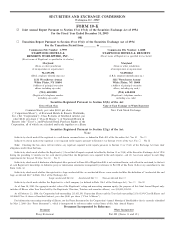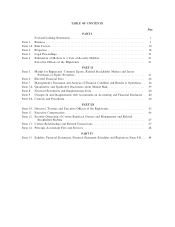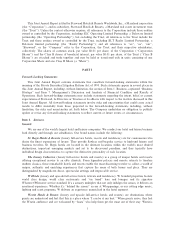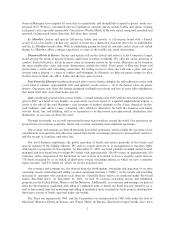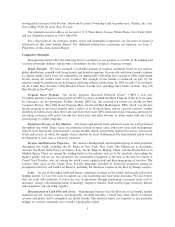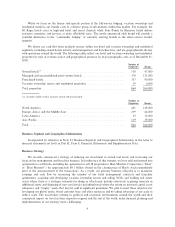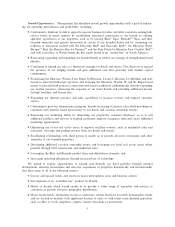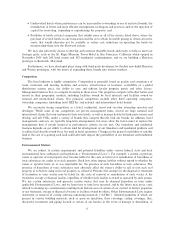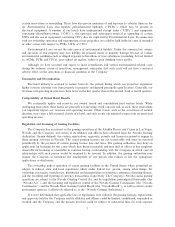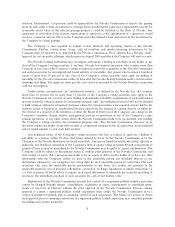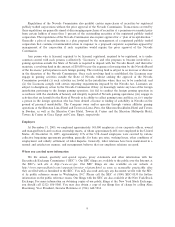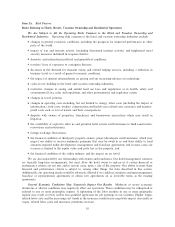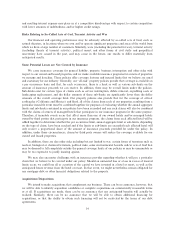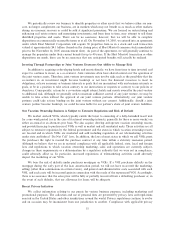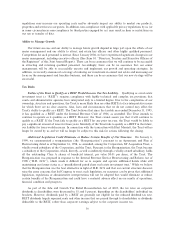Starwood 2005 Annual Report Download - page 11
Download and view the complete annual report
Please find page 11 of the 2005 Starwood annual report below. You can navigate through the pages in the report by either clicking on the pages listed below, or by using the keyword search tool below to find specific information within the annual report.certain renovations or remodeling. These laws also govern emissions of and exposure to asbestos Ñbers in the
air. Environmental Laws also regulate polychlorinated biphenyls (""PCBs''), which may be present in
electrical equipment. A number of our hotels have underground storage tanks (""USTs'') and equipment
containing chloroÖuorocarbons (""CFCs''); the operation and subsequent removal or upgrading of certain
USTs and the use of equipment containing CFCs also are regulated by Environmental Laws. In connection
with our ownership, operation and management of our properties, we could be held liable for costs of remedial
or other action with respect to PCBs, USTs or CFCs.
Environmental Laws are not the only source of environmental liability. Under the common law, owners
and operators of real property may face liability for personal injury or property damage because of various
environmental conditions such as alleged exposure to hazardous or toxic substances (including, but not limited
to, ACMs, PCBs and CFCs), poor indoor air quality, radon or poor drinking water quality.
Although we have incurred and expect to incur remediation and various environmental-related costs
during the ordinary course of operations, management anticipates that such costs will not have a material
adverse eÅect on the operations or Ñnancial condition of the Company.
Seasonality and DiversiÑcation
The hotel industry is seasonal in nature; however, the periods during which our properties experience
higher revenue activities vary from property to property and depend principally upon location. Generally, our
revenues and operating income have been lower in the Ñrst quarter than in the second, third or fourth quarters.
Comparability of Owned Hotel Results
We continually update and renovate our owned, leased and consolidated joint venture hotels. While
undergoing renovation, these hotels are generally not operating at full capacity and, as such, these renovations
can negatively impact our revenues and operating income. Other events, such as the occurrence of natural
disasters, may cause a full or partial closure of a hotel, and such events can negatively impact our revenues and
operating income.
Regulation and Licensing of Gaming Facilities
The Company has an interest in the gaming operations of the Aladdin Resort and Casino in Las Vegas,
Nevada and the Company and certain of its aÇliates and oÇcers have obtained from the Nevada Gaming
Authorities (herein deÑned) the various registrations, approvals, permits and licenses required to engage in
these gaming activities in Nevada. The casino gaming licenses are not transferable and must be renewed
periodically by the payment of various gaming license fees and taxes. The gaming authorities may deny an
application for licensing for any cause which they deem reasonable and may Ñnd an oÇcer or key employee
unsuitable for licensing or unsuitable to continue having a relationship with the Company in which case all
relationships with such person would be required to be severed. In addition, the gaming authorities may
require the Company to terminate the employment of any person who refuses to Ñle the appropriate
applications or disclosures.
The ownership and/or operation of casino gaming facilities in the United States where permitted are
subject to federal, state and local regulations which under federal law, govern, among other things, the
ownership, possession, manufacture, distribution and transportation in interstate commerce of gaming devices,
and the recording and reporting of currency transactions, respectively. The Company's Nevada casino gaming
operations are subject to the Nevada Gaming Control Act and the regulations promulgated thereunder (the
""Nevada Act''), and the licensing and regulatory control of the Nevada Gaming Commission (the ""Nevada
Commission'') and the Nevada State Gaming Control Board (the ""Nevada Board''), as well as certain county
government agencies (collectively referred to as the ""Nevada Gaming Authorities'').
If it were determined that applicable laws or regulations were violated, the gaming licenses, registrations
and approvals held by the Company and its aÇliates and oÇcers could be limited, conditioned, suspended or
revoked and the Company and the persons involved could be subject to substantial Ñnes for each separate
7



